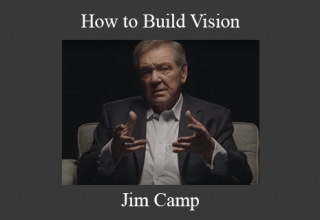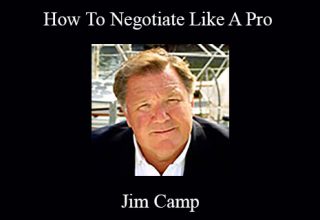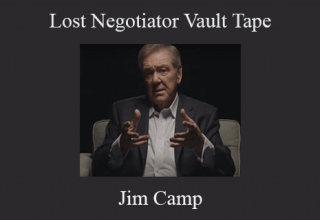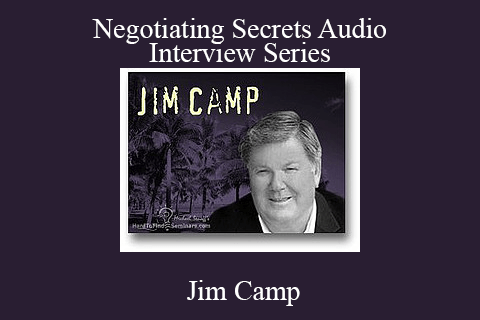Negotiating Secrets Audio Interview Series – Jim Camp
– Sale page –
I’m Michael Senoff and I’ve teamed up with Jim Camp, arguably the worlds top negotiator to bring you a training the likes you have never heard before.
Jim Camp was the leading global expert on negotiations. Over the last 25 years, he trained and coached over 100,000 people to negotiate better, more profitable agreements in more than 500 multinational organizations.
Nine years ago, I was fortunate enough and invited to interview Jim for a group of marketing consultants I was training with my HMA Marketing Consulting System.
Jim told me my consultants could ask him anything on the subject of negotiating and there was no time limit on the interview.
It’s unbelievable what I was able to get out of Jim in these interviews.
I interview him as I’ve never interviewed anyone before.
In this nine part training, you’ll hear Jim’s answers to over 174 select questions on the the secrets of negotiating.
Consider this your master class on the subject of negotiating and learn how to finally and strategically get what you want.
The late, great, Jim Camp is no longer with us today. But his words, stories and trainings live on. He was the best there’s ever been.
It’s all here in your Jim Camp Negotiating Secrets Interviews below.
Click To Order
HERE’S WHAT YOU GET
1. Part One: How To Escape The “Mind-Field”
– 42-minutes, 48-page transcript containing both Part One and Part Two
For the full description of each interview click here.
2. Part Two: Avoiding The Objection Trap Is As Simple As Leaving All “Intellectual” Information At Home
– 39-minutes, 48-page transcript containing both Part One and Part Two
For the full description of each interview click here.
3. Boiling It Down To The Basics: How To Get Started The Right Way
– 36-minute audio, 13-page transcript
For the full description of each interview click here.
4. Managing Raw Emotions and Fear
– 53-minute audio, 22-page transcript
For the full description of each interview click here.
5. The Meat And Potatoes Of Negotiating Success: Creating The Vision You Need
– 32-minute audio, 13-page transcript
For the full description of each interview click here.
6. How To Stop Compromising Once And For All
– 40-minute audio, 16-page transcript
For the full description of each interview click here.
7. The Only 3 Things That Matter In A Negotiation
– 28-minute audio, 10-page transcript
For the full description of each interview click here.
8. A Foolproof Way To Avoid Failure
– 38-minute audio, 14-page transcript
For the full description of each interview click here.
9. Jim Camp’s Most Important Case Studies
– 59-minute audio, 40-page transcript
For the full description of each interview click here.
You get all nine of these recordings for a one time payment of $597.
Click To Order
HERE’S WHAT THE JIM CAMP MASTER NEGOTIATOR INTERVIEW SERIES WILL DO FOR YOU
If you’ve ever lowered your price, lost a prospect or compromised on anything in your personal or professional life, these negotiating interviews will change everything for you.
Once you understand the lesser-known negotiating strategies and use a system of negotiation, you’ll have found the one tool that can get you what you want.
This includes what you want in business, what you want in your home life and what you want in your personal relationships including both family and romantic.
People don’t get what they want, they get what they negotiate. And this one statement has never been truer than it is today.
Download, listen to or read the transcripts to all nine parts (420 minutes of expert training, 174 Questions Covered ) of the Jim Camp Master Negotiator Interview Series.
Then study and use his techniques and you’ll gain an understanding about the one of the most powerful life secrets known to man. How to negotiate winning agreements.
And now you can get all of this training for only $597.00 without any ongoing payments.
HERE’S HOW TO ORDER
Click the Yellow Buy Now Button Below
Note: It may take a second or two for the order window to open up. Be patient
Your Jim Camp Negotiating Secrets Audio Interview Series will be sent instantly after your order is placed.
The second you place your order, PayPal will re-direct you to a page with a yellow button that when clicked will take you to your download page.
After you make your payment, you will see the image below and you want to click on that button to access your downloads. I’ll also send you the links and page to the PayPal e-mail address you used when you placed your order by e-mail. You will have a direct link to your Jim Camp Negotiating Secrets Audio Interview Series.
If you have any questions text or call 858-692-9461.
Sincerely,
Michael Senoff
Your Jim Camp Master Negotiator Interview Series Detailed Interview Descriptions Below
You’ll be able to immediately download the Jim Camp Master Negotiator Interview Series Instantly After Payment Which Includes:
1) Part One: How To Escape The “Mind-Field”
Confidence is everything. If you let fear and worry dominate your mind before a meeting by telling yourself things like, “They’ll probably think my fees are too high for my amount of experience,” you’ll end up compromising your whole negotiation – including your integrity.
Every decision is based on an emotional vision. So you have to find a way to get into your adversary’s vision and become an integral part of it. And in Part One, you’ll hear how to do that. You’ll also hear…
• Why coming across as a stumbling, bumbling “nice guy” may give you a leg up at the negotiating table
• The seemingly harmful (but deal-killing) statements most people make that could be costing them millions of dollars every time they say them
• How to apply negotiating techniques to cold calling that will put prospects at ease and help you get through to decision makers
• Simple ways to put an end to challenges and objections by essentially making every “no” look like a “yes”
• How to use the system to “get in the zone” and close every deal on auto-pilot
• The one best way to stop sounding needy and desperate during a negotiation – even if you ARE needy and desperate.
Part One is 42-minutes and includes an accompanying 48-page transcript containing both Part One and Part Two
Click To Order
2) Part Two: Avoiding The Objection Trap Is As Simple As Leaving All “Intellectual” Information At Home
Jim has never given a PowerPoint presentation in his whole 40-year career and doesn’t plan to either. Why? Because once you start presenting intellectual information in a negotiation, you’re opening the door for objections. Instead, you want to create a vision.
But because this is your adversary’s vision and not yours, you should only be concerned about questioning and listening – and never “presenting.”
And in Part Two, you’ll hear how to do that, along with…
• The one and only time you should walk away from a negotiation – and the outcome likely to happen if you do
• Why you’ll never hear Jim use words like “power,” “leverage,” and “advantage” – and what really drives a successful negotiation
• How to create a “vision of pain” in your adversary and how to use that to negotiate a beneficial conclusion for yourself
• The most certain way to set an agenda that allows your adversary to see the value of what you’re offering
• The 4 main variables that affect the outcome of every negotiation
Most people walk into a negotiation and just start presenting. They think they’ll be able to convince the other person that they need whatever they’re selling. But it usually doesn’t work that way.
So be prepared to throw out everything you’ve ever learned about negotiations and keep an open mind because this audio is likely to change the way you make agreements in all aspects of your life.
Part Two is 39-minutes and includes an accompanying 48-page transcript containing both Part One and Part Two
Click To Order
3) Boiling It Down To The Basics: How To Get Started The Right Way
Little kids are great negotiators. Problem is, as we get older the fear of failure sets in, and it becomes harder and harder to get out of that mindset. But it’s not impossible. Every brain on the planet makes decisions in exactly the same way.
So once you have a system in place, you won’t need to worry about negotiating anymore. You can just relax and know that you won’t be cutting your price, sweating out a compromise, saying the wrong things or even worrying about the outcome – because you’ll perform every negotiation the right way… and on autopilot.
So in Part One, Jim uses the first 25 questions from students to break down his system to its most basic level in order to give you the solid foundation you need to start mastering every agreement.
You’ll Also Hear…
• How to recognize when you’re falling into the “mindset of fear” and how to get out fast
• 5 quick-start steps that will take you through even the toughest of negotiations
• The attitude-trap you won’t want to fall into because it instantly builds barriers and puts people off before you even open your mouth
• What you need to know about “hiding the ball” in a negotiation and when to use that strategic device
• The one correct attitude you should have for a successful negotiation (Believe it or not, it has nothing to do with being positive or negative)
• Exactly what Jim calls the “greatest waste of resources” and how to stop yourself from falling into that worst case scenario
You can’t win or lose a negotiation. And you can’t convince someone to do something. This system isn’t about manipulating a negotiation; it’s about mastering it. And Part One will help you get rid of any preconceived notions you have about the process, so you can start right where you need to be – at square one.
– 36-minute audio, 13-page transcript
Click To Order
4) Managing Raw Emotions and Fear
You can’t be weak or timid in a negotiation, but you can’t be aggressive either. Aggressiveness gets gobbled up too. So what do you do when you’re bubbling over with natural anxiety, fear, desperation, or an all-around lack of self-confidence? That’s where having a system in place makes all the difference.
And in Part Two, Jim answers questions 26-79 from students about managing fear while staying focused and calm during a negotiation.
The good news is, Jim says people who aren’t naturally assertive make great negotiators once they know the system. In fact, it may actually be a good thing not to be overly confident. And in this audio, you’ll hear how to make your emotions work for you. You’ll also hear…
• The most difficult piece to the negotiation puzzle that must be determined before you sit down to any negotiating table
• How to create a “vision of failure” in gatekeepers that will have them believing it’s in their best interest to let you through to the decision maker right away
• The one and only way to rebound once you’ve shown you are timid, weak, or needy
• How to use the “three-plus” rule to uncover mistruths and misdirection, peel back the onion, and get to the psychology of any sticky situation
• Exactly what to do when an adversary is being overly aggressive or deceptive
• The no-pain way every negotiation should end
Unfortunately, you can’t just “wing it” when it comes to confidence, but that doesn’t mean there’s no hope. And in Part Two, you’ll hear how to end your fear of failure and take control over your emotions – no matter how intimidated you are.
– 53-minute audio, 22-page transcript
Click To Order
5) The Meat And Potatoes Of Negotiating Success: Creating The Vision You Need
Jim is always on. During a negotiation, he’s not worrying about his presentation. He’s busy running research about his adversary – by listening, probing, taking mental notes, and learning. Too many people forget to do that and instead become so busy trying to “show what they’ve got” in 20 minutes or less that they end up frustrated. And wondering why the negotiation failed again.
If you can get into the world of your adversary, you can integrate yourself into their vision. And that’s a huge part of a successful negotiation.
But in order to do that, you have to stop thinking win-win. According to Jim, that mindset only makes people feel like they need to win at any cost (and that cost usually comes at your own expense). So in this Q-and-A interview, you’ll hear Jim answer questions 80-96 about the mindset that works to create the vision you need. You’ll also hear…
• What Jim describes as “the giant negotiating secret weapon” – Master this and you’ll master negotiation
• How to make multiple “one-bite-at-a-time” mission statements to help you stay focused during every aspect of your negotiations
• Key strategies for taking care of the problems that could be holding you back– like pricing, past performance, whatever – and end them for good
• How to prepare the all-important checklist that will guide you through every turn, like a personal negotiation-GPS
• The critical nuances to “three-plus” that could make or break how effective it is
• How Jim does his research on a client – and it doesn’t involve your run-of-the-mill, easy-to-acquire website searches
• A word-for-word script to use if a seemingly impossible impasse happens during a negotiation
A great negotiation starts when you stop living in your world and start becoming a part of your adversary’s. And in Part Three, you’ll learn how to do that.
– 32-minute audio, 13-page transcript
Click To Order
6) How To Stop Compromising Once And For All
Even if you’re thinking, “I will NOT compromise this time,” you will – if the only tool you have in your negotiating toolbox is the mindset of “give and take.” You have to train your brain not to make assumptions or compromises, but it’s not easy because we’re surrounded by a flawed win-win mindset.
Think about it. What happens to businesses when the economy tanks? Margins get slashed because owners assume they need to compromise their agreements in the field. Then because profit margins are smaller, they ask employees to take pay cuts. And the employees likely will – because they also have a mindset of compromise. It’s a vicious cycle.
But it doesn’t have to be. And in Part Four, you’ll hear Jim answer questions 96–126 from students about how to create the only mindset that works.
You’ll Also Hear…
• How to get in the habit of using what Jim calls a Blank Slate mindset instead of the usual “Ivory Tower” win-win one
• Exploding the “tactic” myth – why tactics never work in a negotiation and what you should be doing instead
• Exactly what to do with your body posture and voice that will instantly ease tension – while giving you the appearance of having “relaxed confidence”
• A real-life look at three-plus in action – with examples of how to use it to bring out your adversary’s vision
• When and how to confidently throw out the “first offer” in a negotiation without worrying about being shot down in flames
• Exactly what causes 99% of all challenges faced at the negotiating table and how to be prepared for whatever comes up
Having a win-win mindset is like being stuck in a sad little fishbowl full of compromises and “tactics.” Because you can’t get anywhere with it, this kind of mindset only costs you money, opportunities, and growth. And in this audio, you’ll hear how to get out for good.
– 40-minute audio, 16-page transcript
Click To Order
7) The Only 3 Things That Matter In A Negotiation
If you believe your adversary has “power” in a negotiation, you’re setting yourself up for failure before you’ve even begun. That kind of mindset will only generate a self-induced, fearful emotional state. And you’ll be worrying for nothing too.
According to Jim, there is no such thing as power in a negotiation. Or leverage. And believe it or not, he says the price is never a factor either. In fact, it doesn’t make a difference what you’re negotiating, there are only three things that matter – vision, opportunity, and decision.
And in Part Five of this Q-and-A section, you’ll hear Jim answer questions 127-147 from students about how to create those kinds of key elements for every niche, including…
• How having a system will beat back any “tactic” your adversary may try to throw at you
• Exactly what to say to a competitor if he flat out asks, “So… is this going to be a win-win agreement?”
• Negotiating advice for job seekers along with a quick story about how Jim got one of his negotiating students twice the income he was currently receiving
• Why you probably won’t want to tell your adversary that you can increase his profits – and examples of what to say instead that will actually help them visualize the money
In order to have a successful negotiation, you have to stop worrying – about power, fallback positions, and especially compromise because none of that matters. But the good news is – with Jim’s system, you’ll be able to relax and know you’re ready for everything that comes up
– 28-minute audio, 10-page transcript
Click To Order
8) A Foolproof Way To Avoid Failure
Jim says that whenever he’s called in after a failure, he can usually attribute it to a lack of mission and purpose. It doesn’t matter how great you think a negotiation will go, or what industry you’re in – without mission and purpose, things will go wrong. But it’s not enough just to have those things in place. Both your mission and purpose have to be well thought out, clear, and step-step. You also have to make sure they benefit your adversary.
So in this audio, you’ll hear Jim answer more niche-specific questions from students about how to create success in joint ventures, contingency deals, research, audio interviews, and more.
You’ll Also Hear…
• The one simple question to ask that could get you past a gatekeeper right away – Jim asked it, and got one of his clients in to see Lee Iacocca
• How to have the highest price and still be in the running (even for one of those “the cheapest bid will get the contract” web auctions)
• The top 4 ways to create skin in the game using what Jim describes as “the key to the money”
• A word-for-word script to use when a potential client asks, “Okay, so how much is this going to cost me?” that will take the pressure off the price
• How to use Jim’s system in your personal life – and negotiate insurmountable debt, rent, and other cost-of-living staples
• How to make the only kind of contingency deal that’s worth it
Having a strong mission and purpose is critical for negotiating success. But you can’t just create a vision for yourself; you have to create one for your adversary as well. Show them that you understand their problems and challenges, and they’ll be compelled to dig into the opportunity you’re giving them. And in this audio, you’ll hear how to make that happen.
– 38-minute audio, 14-page transcript
Click To Order
9) Jim Camp’s Most Important Case Studies
– 59-minute audio, 40-page transcript
Hear case study after case study from Jim Camp from his incredible career of high-level negotiation.
You’ll hear . . .
* The story about the hostage negotiator.
* The story about how Jim negotiated for a gift for his Mom.
* Hear the story of how he negotiated help for his friend’s wife who was having a baby.
* Hear the story of how he negotiated for the Nabisco Trade Mark.
HERE’S WHAT THE JIM CAMP MASTER NEGOTIATOR INTERVIEW SERIES WILL DO FOR YOU
If you’ve ever lowered your price, lost a prospect or compromised on anything in your personal or professional life, these negotiating interviews will change everything for you.
Once you understand the lesser-known negotiating strategies and use a system of negotiation, you’ll have found the one tool that can get you what you want.
This includes what you want in business, what you want in your home life and what you want in your personal relationships including both family and romantic.
People don’t get what they want, they get what they negotiate. And this one statement has never been truer than it is today.Download, listen to or read the transcripts to all nine parts (420 minutes of expert training, 174 Questions Covered ) of the Jim Camp Master Negotiator Interview Series.
Then study and use his techniques and you’ll gain an understanding about the one of the most powerful life secrets known to man. How to negotiate winning agreements.
And now you can get all of this training for only $597.00 without any ongoing payments.
HERE’S HOW TO ORDER
Click the Yellow Buy Now Button Below
Note: It may take a second or two for the order window to open up. Be patient
Your Jim Camp Negotiating Secrets Audio Interview Series will be sent instantly after your order is placed.
The second you place your order, PayPal will re-direct you to a page with a yellow button that when clicked will take you to your download page. download page. download page.
After you make your payment, you will see the image below and you want to click on that button to access your downloads. I’ll also send you the links and page to the PayPal e-mail address you used when you placed your order by e-mail. You will have a direct link to your Jim Camp Negotiating Secrets Audio Interview Series.
If you have questions call or text 858-692-9461. You may also e-mail [email protected]
Sincerely,
Michael Senoff
You’ll Hear Jim Camp’s Answers To These 174 Questions Below
1. Jim, what is your approach to negotiating?
2. Is negotiating a skill that you are taught in a formal classroom setting or is it a skill set that comes with experience?
3. Tell me what you teach when it comes to negotiating different from what we’ve all seen in the win-win model.
4. What is the biggest misconception with your methodology of negotiation?
5. What’s the ultimate goal with your negotiating system?
6. What is the single most important thing one needs to know about negotiating? Is it to start out with strong demands so that you have some room to fall back?
7. So how do you factor in cultural differences when it comes to negotiations?
8. Describe for the listeners what is collective bargaining.
9. So bargaining is win-win?
10. What do you mean by hiding the ball?
Click To Order
11. What skill, Jim, do you think is most critical to a successful negotiation?
12. What are the stages you go through in a tough negotiation?
13. Why should the listeners want to learn more about the subject of negotiating? What is in it for them?
14. Do you have a mind map about all of the steps or which specific steps to follow when conducting a negotiation?
15. What do you think is the most important attitude to carry into any negotiation?
16. You mentioned FBI and it just sounds like a great story. Is it something you can share?
17. So are they actually using the revamped negotiating?
18. What is the one thing you believe that all great, truly great, negotiators have?
19. How do you decide whether to negotiate something or not? What guidelines do negotiators use to determine whether or not to negotiate or not negotiate something?
Click To Order
20. How do you make sure that you are dealing with the real decision maker in a negotiation?
21. There must be a lot of times in the world where people are negotiating to the wrong people.
22. I believe that negotiating is learning the beliefs and wants and desires of the other person. Do you believe that psychology plays a big role in negotiating?
23. Is there basic psychology to winning or is there a basic rule to win when negotiating like never giving in first or always give in first, etcetera?
24. How important is persuasion architecture in negotiation?
25. Jim, I’m new at negotiating. Do you currently, or did you have when you first started, a cheat sheet to keep on your mind while going into negotiations? For example, to help you remember the top five things to focus on when going into negotiations or do you have an acronym that you used to remind yourself what to keep in mind when first trying to master negotiation? Also when you first started negotiating did you have any fears going into negotiation and if so how did you overcome them and what did you focus on?
26. What is the best advice for a new negotiator to learn?
27. How do you know if you’ve negotiated the best deal, Jim?
28. How hot is the topic of negotiation skills within small companies? Is it regularly trained or is it overlooked as a skill to develop within the corporate culture?
29. Jim, do you go into negotiations knowing the exact outcome you want?
30. How do you determine when to walk away? Or, in other words how do I know when it’s time to break off the negotiation?
31. Often times the decision makers are surrounded by gatekeepers of different sorts: assistants, managers, etc. What is your best suggestion for negotiating with these gatekeepers to get through to the owner, principal, or decision maker?
32. How do you quickly determine other party’s hot buttons; that is what their number one need is out of the proposed agreement?
Click To Order
33. Can an interrogative negotiation be effective when parties have unequal power where one is recognized as having a greater position or strength?
34. Jim, I sometimes deal that with international customers who seem to have no problem with win-lose negotiations, how should I deal with them?
35. What makes the difference between a good negotiator and a great negotiator?
36. Other negotiation coaches teach tactic and closing, how do you go about dealing with these types to negotiators using the Camp method?
37. Isn’t it true that both sides should feel some pain at the end of a successful negotiation? Please elaborate.
38. How do you know when you have gotten everything possible out of a deal?
39. Why don’t Power-Point presentations work? Why do so many gurus use them?
40. So often I hear women trying to act like men in business. How can women be more effective in negotiating?
41. How to I encourage someone to negotiate who refuses to consider any option other than what is best for them?
42. How much do you need to negotiate before you sign a contract? Are there details that can be ironed out after signing? Or is it good to have all the details nailed down before signing anything?
43. I would like to hear you, Jim, debunk the common myths of negotiating such as make an offer and shut up, next person to speak loses, feel free to add any of your own.
44. Hi Jim, is it a process that you follow when you are going nose to nose with the big boys?
45. How does negotiating via email differ from face to face or telephone negotiating?
46. It is more effective email or phone?
Click To Order
47. What can you do when the other side won’t even come to the table and doesn’t appear to be able to afford the laid down arbitration procedure?
48. What’s the mindset you start with going into any negotiation when you know the other guy is very skeptical or defensive about what you’re proposing or offering?
49. Jim, how do you deal with people who get difficult or aggressive in a negotiation?
Digital Download Negotiating Secrets Audio Interview Series – Jim Camp
50. How do posture myself with confidence but not arrogance, so everybody wins?
51. How does one build trust during a negotiation?
52. Can you give some negotiating tips for people that are not naturally assertive?
53. What’s the best approach to negotiating working with a close friend so as not to ruin the friendship, but to get business done?
54. What’s the best strategy for people who are slow on their feet when negotiating has to be done in person?
55. How do personality types affect negotiating? Can you tailor strategies to specific traits or personality types?
56. What subtle body movements or voice inflections indicate to you that a client is ready to negotiate in your favor?
57. I tend to be a friendly person, but in negotiating people see that as a weakness and attempt to take advantage of that. How can I establish early on that friendliness does not mean I’m giving you all that you ask?
58. How can a person who is non-confrontational by nature, become comfortable jockeying to get what you want in a negotiation?
Click To Order
59. How do I manage my emotions, for example, unhappiness and anger, during the negotiation process?
60. How can an introverted person overcome the fear of negotiation?
61. I don’t do much formal negotiating in my job, but when I do, I very often feel intimidated by the other party. So my question is, Jim, how do you control feelings of weakness and a lack of self-confidence in negotiations?
62. What should you do if you really do need to make a deal happen? How can you still negotiate from strength?
63. How much does physical stance portray in negotiations?
64. How do you deal with the adversary who brings a psychic to the negotiating table?
65. How do you persuade someone to do something if they are adamant about not doing it?
66. I’m a struggling small business owner and a marketing consultant. Is there a way to appear more confident and relaxed when sitting down to negotiate price and terms for my consulting services? I know in earlier recordings you have even recommended working part time, etc., in order to be in a better position. I’m doing quite a few things for income, but I’m still coming up short. I have a rather large opportunity coming up with a cash-flush client, and want to negotiate a long-term agreement with a significant amount up front. My true situation is that I’d take just about anything he offers, because I need the money. It’s an okay position to be in, but bad for negotiating my real needs. I’m also afraid of negative subliminal needy vibes, not just in this case, but my day-to-day prospecting and selling. Could a bad financial situation be hindering many of us in this difficult economy?
67. Are there things to look for that could indicate the person you are negotiating with is dishonest or the deal is dishonest or a lie?
68. You’re getting ready for the biggest make-or-break deal you’ve ever had and you are feeling the stress. What self-talk do you use to calm yourself down?
69. When one has a problem with self-confidence, and they come across as fearful, timid or weak to the other party in the communication of a business deal, how can that person rebound within the negotiation to gain credibility and the upper hand in the mind of the other party.
Click To Order
70. Some years back I heard it said, “He who cares least, wins.” Since then I have followed this selling negotiating technique and employed it moderately successfully. It allows for me to be myself, and more relaxed when sending a positive and reassuring signal to the other guy. Truthfully I did not always come away from the table with what I wanted to occur, but often what would happen is they would call me back and tell me things like, “We like your style and feel more comfortable with you.” Or they would tell others about me. In short, I tried to negotiate in such a way that all parties were relaxed. The bonus was multiple long-term deals came my way. Any suggestions on how I can take my personal style and improve on it?
71. How do I know when I’m asking for too much in a negotiation situation? I have been told that it’s effective to appear intimidating in negotiations, however, I have a friend who is so nice and jovial when he meets
The Course Is Available For Immediate Download
All These Courses Are Instant Delivery Using Our Private Server (Mega.nz, Google Drive)
- Instant Access
- Easy fast One-Click download
- No wait times and DON’T need premium accounts
- The courses are up to date and will receive ALL the updates from the creators
1. After payment, you will instant receive a link from our PRIVATE server to download all the content from the course (videos, audios, docs, pdf, screenshots, etc.)
2. You only need to click on the link, and you will have access to an online folder with the content of the course. You can download the whole course as a zip file or you can choose a specific file to download.







